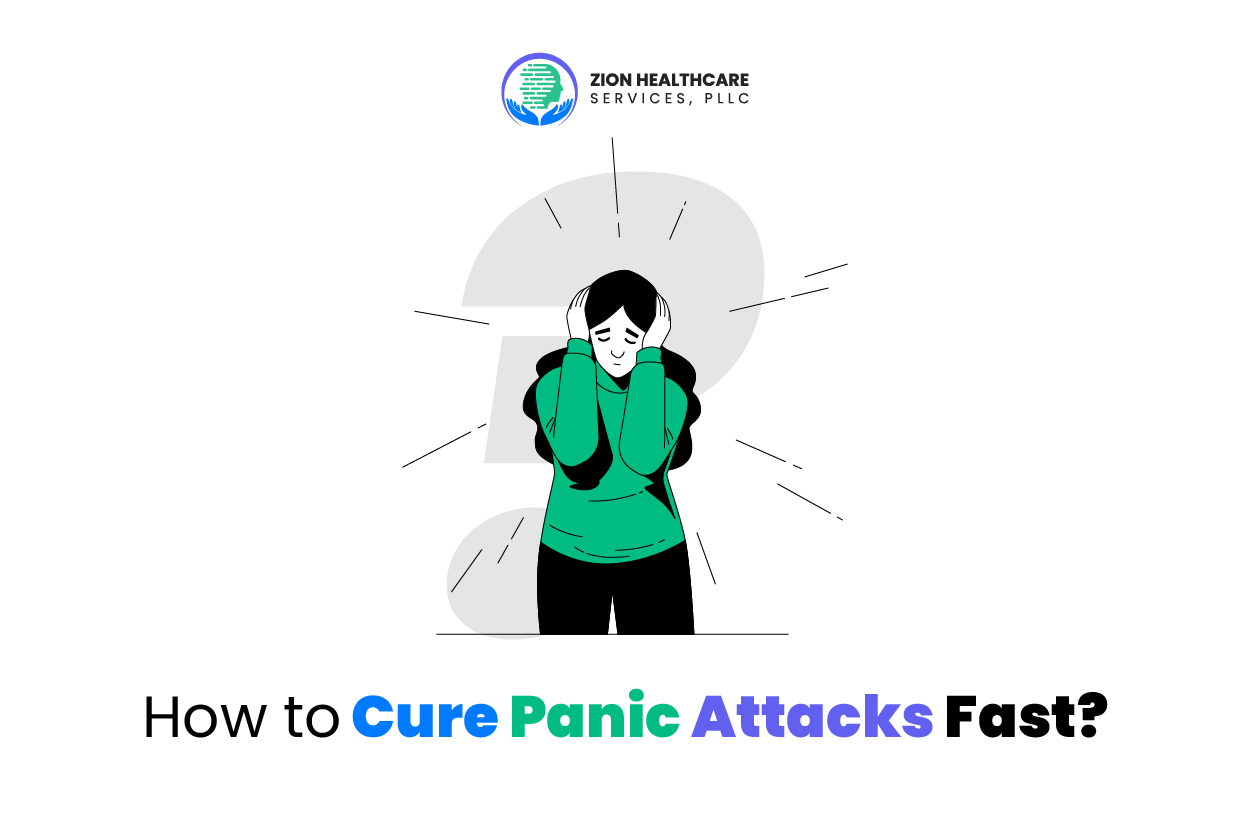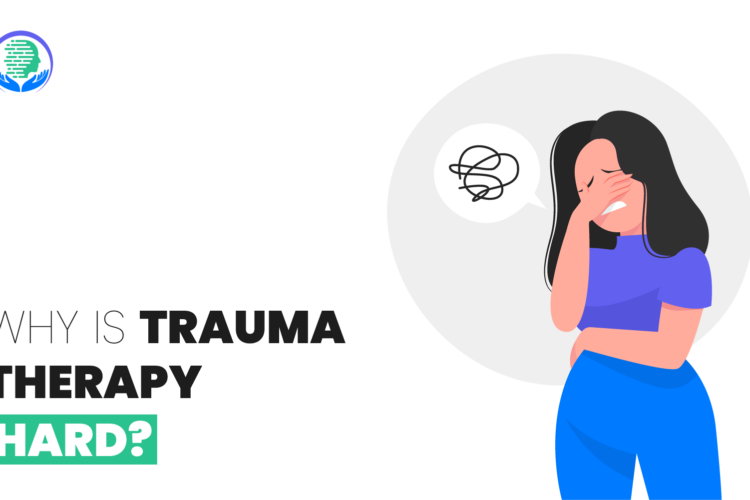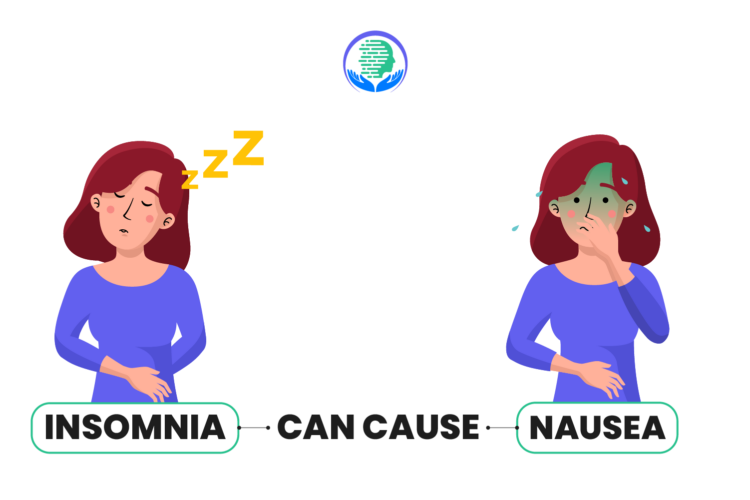
How to cure panic attacks fast? There are some things you can do if a panic attack hits. Taking slow, deep breaths is one — this can help your body relax.
Another is focusing your mind on how your body feels. Take a moment to visualize each part becoming calm.
Additionally, talking to a mental health professional later can help, too. In this way, they can find out what triggers the attacks.
If it happens again, they can provide you with ways to cope and help you find sustainable solutions.
You can count on Zion Healthcare Services for panic attack relief — reach out today.
What Is a Panic Attack?
A panic attack is when someone experiences extreme fear, and their heart starts beating fast.
During a panic attack, a fast heartbeat, sweating, and dizziness can happen.
The physical sensations can feel frightening and uncomfortable.
Panic attacks usually peak in 10 minutes or less, but the effects of the panic can last much longer.
The signs appear and are usually very intense.
To get more information and help, you may contact us.
Panic Attack Symptoms
Some common symptoms of a panic attack are:
- Pounding or racing heart.
- Sweating.
- Trembling or shaking.
- Shortness of breath or feeling smothered.
- Choking feeling.
- Chest pain.
- Numbness or tingling in fingers/toes.
- Feeling dizzy, lightheaded, or faint.
- Chills or hot flashes.
- Fear of losing control or “going crazy.”
- Fear of dying.
- Nausea or stomach pain.
Panic Attack Causes
Causes or triggers of panic attacks are:
- Work issues, relationship problems, a death in the family, etc.
- Excessive worrying or pre-existing anxiety conditions. it includes generalized anxiety disorder, or social anxiety disorder increased risk.
- Consuming a lot of caffeinated drinks. It includes coffee, tea, sodas, or energy drinks.
- Conditions like hyperthyroidism, asthma, or mitral.
- Quitting substances like benzodiazepines could trigger withdrawal panic.
- A past traumatic event. It includes; abuse, assault, or combat. It could leave someone vulnerable to panic when reminded of the trauma.
How to Cure Panic Attacks Fast?
The right methods can help you manage panic attacks effectively and swiftly.
Here’s what you can do:
Breathing Techniques
When a panic attack strikes, your breathing can become quick and shallow.
One of the easiest ways to regain control is by practicing deep breathing exercises.
Close your eyes, breathe in slowly through your nose for a count of four, hold your breath for a second, and then exhale slowly through your mouth for a count of four.
This technique can help slow your heart rate and calm your mind.
Grounding Techniques
Grounding techniques can distract you from the anxiety of a panic attack and help you focus on the physical world around you.
This can be as simple as holding an ice pack, focusing on the texture of an object in your hand, or describing what you see in a picture.
Consult a Professional
While these methods can provide immediate relief, it’s important to consult a health professional if panic attacks don’t go away.
Cognitive behavioral therapy is successful in treating panic disorders and it can help you cope on a long-term basis.
You can reach out to Zion Healthcare Services today to get support for panic attacks.
Types of Panic Attack
Silent Panic Attacks
Silent panic attacks refer to panic episodes.
In such a situation, someone experiences the emotional symptoms of panic without pronounced physical symptoms.
A silent panic involves intense fearful thoughts and feelings without obvious distress.
Things like dread of losing control, fears of dying, and worries about “going crazy” are common. These are the internal experiences of silent panic.
The lack of physical cues can cause silent panic attacks. It is harder to recognize as panic rather than normal anxiety.
Treatment is the same as regular panic disorder. It involves addressing cognitive distortions and learning to face anxious feelings.
Recognizing the thought patterns associated with panic can help.
Ketamine Panic Attack
Ketamine is a dissociative anesthetic that works by blocking NMDA receptors in the brain.
At recreational doses, it can cause dissociative or hallucinogenic effects.
Some people report having panic attacks or experiencing increased anxiety after taking ketamine.
This is more common at higher doses.
The dissociative effects of ketamine may trigger panic by distorting perceptions. It causes feelings of derealization or depersonalization.
Anxiety disorders or a family history of mental illness increase the risk of ketamine-induced panic attacks.
Panic attacks while on ketamine may be difficult to manage.
Panic Attack Vs Autistic Meltdown
| Panic Attack | Autistic Meltdown |
| Caused by the sudden surge of anxiety/fear. | Caused by sensory overload or being overwhelmed. |
| Physical symptoms like rapid heartbeat, sweating, shaking. | No physical symptoms, purely emotional response. |
| Peaks within 10 minutes, lasts a short time. | Can last 30+ minutes, even hours. |
| A person understands they are not actually in danger. | A person loses the ability to communicate needs/process information. |
| A person can usually engage in self-soothing. | A person needs to discharge intense emotions before calming down. |
How To Calm Down Emetophobia Panic Attack?
Some tips to help calm down during an emetophobia panic attack:
Deep Breathing
Start by focusing on your breathing; slow, deep breaths can help reduce your anxiety.
Try the 4-7-8 breathing technique: inhale for 4 seconds, hold your breath for 7 seconds, and exhale slowly for 8 seconds.
Ground Yourself
Try to focus on the details of your surroundings, or hold onto something tactile, like a smooth stone.
Reassurance
Remind yourself that the symptoms are from panic, not actual illness.
Distractions
Sip water, chew gum, listen to calming music or meditate to redirect attention away from fears.
Muscle Relaxation
To relieve tension in your body, tense and release muscle groups from your toes to your shoulders.
Happy Memories
Think of comforting past experiences to shift your thinking.
Manage Anxiety Naturally: How to Cure Panic Attacks Fast
Natural ways to help manage anxiety are:
- Physical activity releases feel-good endorphins and is a healthy way to relieve stress. Even a 30-minute walk daily can help.
- Mindful practices focus attention on the present moment rather than worries. This can lower stress and calm the nervous system.
- Herbal teas such as chamomile, lemon balm, and passionflower. These can reduce anxiety.
- Use essential oil blends for anxiety and panic attacks.
- Valerian is a supplement that acts on GABA receptors in the brain to calm anxiety.
- Writing down worries and thoughts provides perspective and emotional release.
- Being outside among trees and greenery lowers stress hormone levels.
OCD And Panic Attacks
OCD and panic disorder often co-occur. Having one disorder increases the risk of developing the other.
OCD themes/thoughts can trigger panic attacks.
For example, fears of contamination lead to hand-washing compulsions which cause panic.
The physical sensations of panic may reinforce obsessive fears.
Anxiety sensitivity is high in both OCD Panic Attacks and panic. This is the tendency to misinterpret anxiety symptoms.
Repetitive behaviors in OCD provide temporary relief from anxiety and panic.
Medications for OCD like SSRIs can also treat panic attacks.
Final Thoughts
How to cure panic attacks fast?
- Do ground techniques.
- Breathing techniques.
- Find professional support if your panic attacks persist.
Panic attacks can happen at any time without warning. When this happens often, it can be difficult to do normal things.
If panic attacks worry you, seek professional help.
The doctor will be able to figure out what is causing the panic feelings and treat them accordingly.
Don’t be afraid to tell the doctor about your attacks.
There are lots of people with this problem, and they want to help you feel better and safer.
If you or anyone you know is experiencing panic attacka, you can visit Zion Healthcare Services.
FAQs
Can you prevent a panic attack?
Here are some things people can do every day to feel less worried and not get panic attacks as often:
- Take slow breaths. Breathing slowly calms the body down.
- Yoga, stretch, and bend the body. Moving gently relaxes stress.
- Sit still and think peaceful thoughts. Being calm in mind helps stay calm in body.
What does a panic attack feel like?
During a panic attack, a person may experience intense physical sensations.
It includes a racing heart, sweating, trembling, chest pain, or difficulty breathing.
They also feel sudden and overwhelming fear, terror, and a sense of impending doom or loss of control.
Can Adderall cause panic attacks?
For people who get panic attacks, Adderall could bring on scary feelings.
It affects the heartbeat and breathing, not because of anything dangerous.
What is the 3 3 3 rule for panic attacks?
The 3-3-3 rule is a helpful technique to manage panic attacks.
When you start feeling a panic attack, try to follow these steps:
- Look around and name three things you see, then name three sounds you hear.
- Finally, move three parts of your body — your fingers, your feet, or your arms.
This simple grounding exercise aims to bring your focus back to the present moment.
How did you cure your panic attacks?
Here are some simple ways people deal with panic scare feelings:
- Breathe and deeply. Go slow with air helps calm the body.
- Talk to a friend. Sharing feelings with a person you trust helps feel not alone.
- Drink tea. A warm drink with calm flavors can relax.
- Move body. Exercise like walk gets heart pumping without scare.


